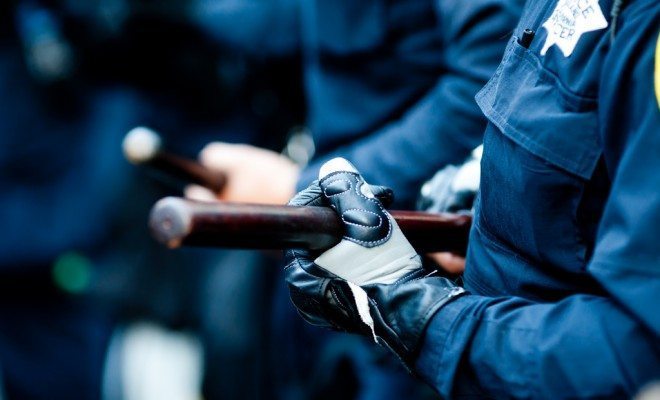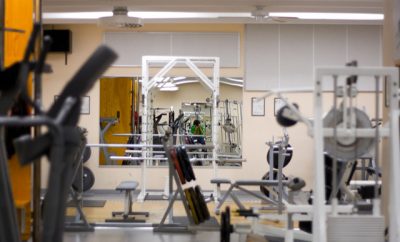 Image courtesy of [Thomas Hawk via Flickr]
Image courtesy of [Thomas Hawk via Flickr]
Society and Culture
An Us Vs. Them Mentality Won’t Fix the Problem of Police Brutality
Najee Harmon is a 20-year-old man, and the primary suspect in the shooting of a Wauwatosa, WI detective on June 19. He’s been charged with three counts of attempted first degree intentional homicide and one count of felony possession of a firearm. After investigating a recent burglary, officers were on foot observing reported stolen vehicles, when Harmon fired several shots at Detective Jeffrey Griffin, injuring the officer. A manhunt took place for 24 hours, and he was finally found hiding in the basement of a long-time friend, Stephanie King.
But what struck me was what happened when King was interviewed; her comments raise a lot of questions about the “us vs. them” mentality that has begun to take hold between Black communities and the police.
While the focus from the media was on Harmon’s violent acts, King defended him saying, “To me he ain’t do no wrong, he just shot a cop. Everyone comes around when they shoot the cop. But when the cops shoot people, do they come around?”
While it’s never ok to shoot someone–particularly an innocent someone, what frustrates me so much about this interview is that she is partially right. Given recent events involving instances of police brutality many Black people are afraid for their lives. Recent events have proven that you can be the best looking, speaking, well-mannered, and respectful Black person and still be killed for the color of your skin. So, King’s logic makes some sense, although it certainly doesn’t make Harmon’s actions right. But you can’t fully blame her for this logic–this is what the newest frontier in the race war has come to look like in the United States.
The tension between minority communities and the police is neither a small nor a dying issue. #BlackLivesMatter protests across the country have called for reforms and increased accountability surrounding police shootings and a reduction in the use of military equipment by local police departments.
“The system of policing has earned our mistrust,” said Opal Tometi, a New York-based activist and co-founder of the #BlackLivesMatter campaign.
It seems like every day you turn on the news and hear a story of yet another Black male who has died at the gun of a White police officer. There are tensions between communities and police officers, particularly when stories of corrupt police officers stealing drugs or money abound. Stigmas develop as these stories are passed throughout communities. This anger has built up to an all-time high. Black Americans are frustrated, sick of being mistreated, and it has gotten to the point where they believe the only solution is to take matters into their own hands. Black communities often feel like the people who are supposed to protect them are becoming those who victimize them instead.
There are some understandable explanations for this. Police officers do not always understand the communities they are patrolling. Sometimes they enter these communities, and don’t know what they’re dealing with or how community members are feeling. There are many factors that can contribute to problems with the police, but this is a common problem with police officers in minority communities. This does not, of course, excuse genuine wrong they’ve done, but can be a starting point for a discussion about the issues they face as officers of the law.
On the other hand, in the defense of the police officers, their jobs require them to risk their lives regularly. In interviews with media outlets, officers often speak of being afraid during particular incidents and discharging their weapons because they feel it’s the best way to protect themselves. Granted, there are police officers who lie about this to cover something they’ve done, but fear can certainly affect how a police officer does his job. It’s easy to forget that our police officers may genuinely be scared in some instances–after all we don’t want to picture our protectors fearful. But they’re certainly not perfect–just like the rest of us experience personal problems and pressures outside their jobs, they do too.
Arguably the biggest issue between minority communities and police officers is a lack of respect. Minority communities do not respect police officers, and because police officers know there is disrespect, they have the potential to act out of anger and frustration. So how can we improve this growing issue? One way is to advocate and speak up. For example, Black Lives Matter has given national attention to the growing mistreatment African-Americans face. People usually turn the other cheek because it’s not their problem, but this really is a problem for all of us.
There is some potential for improvement–by investing in solutions like community policing, we can hope to build that mutual respect. Through partnerships with community organizations, community members can feel heard, respected, and empowered to help police control crime in their neighborhoods. Developing these relationships, while not a complete solution, is certainly a step in the right direction, and may break the us vs. them narrative. Harmon’s actions and King’s statements are just one example of the compelling need to fix this horrible division in American society.








Comments